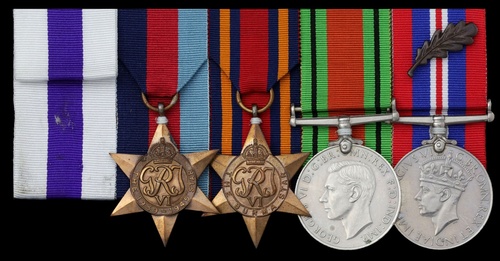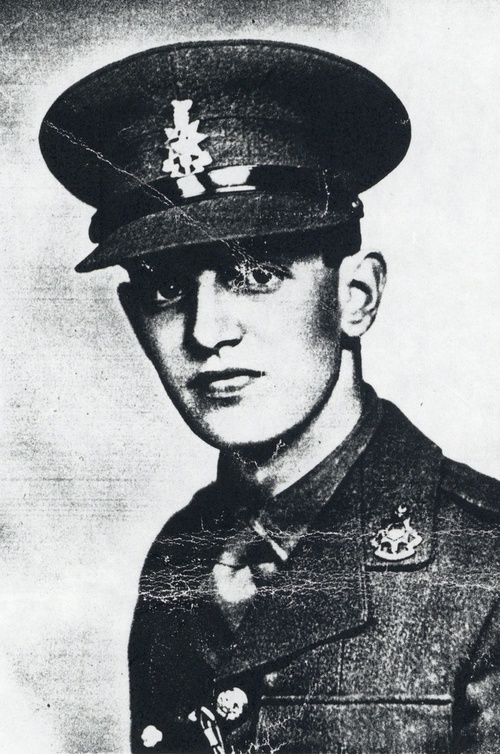Auction: 19001 - Orders, Decorations and Medals
Lot: 883
(x) Four: Captain G. H. Borrow, M.C., King’s Liverpool Regiment, late Royal Sussex Regiment, A.D.C. to Major-General Orde Wingate and killed with him when their B-25 Mitchell bomber crashed in Burma in March 1944
1939-45 Star; Burma Star; Defence & War Medals, with M.I.D. oak leaf, together with named Army Council condolence slip (Captain G. H. Borrow, M.C.) extremely fine (4)
[M.C.] London Gazette 16 December 1943. The original recommendation states:
‘Throughout the operations in Burma from mid-February to mid-May 1943, Lieutenant Borrow acted as Intelligence Officer to H.Q. No. 2 Group. He insisted on accompanying the expedition [Wingate’s first Chindit operation] despite the fact he was suffering from jaundice. The continued privations and hardships of the campaign prevented him from ever recovering his health in the course of it, and in the latter stages he suffered intensely from internal disorders, general weakness and a malady which attacked his legs and made marching extremely difficult and painful. Despite the effects of these serious inroads upon a state of health already poor, he showed throughout the campaign a superb example of doggedness and courage which aroused the admiration of every officer and man who saw him, and inspired them all to emulate his magnificent endurance. His work as Intelligence Officer not only did not suffer from his bad state of health, but would have been remarkable for its thoroughness and efficiency in ordinary circumstances; while his behaviour under fire was exemplary. His high spirit helped immeasurably to carry the party with which he was travelling through the most arduous trials until the British lines were reached, when, after an example of steadfastness and endurance which cannot often have been surpassed, he finally collapsed.’
George Henry Borrow was born at Brome, Norfolk, on 25 September 1921, son of Major Edward Borrow, D.S.O., and his wife Alys. Educated at Greshams, Holt, and Selwyn College, Cambridge, he joined the Army in 1941 and was commissioned as 2nd Lieutenant in the Royal Sussex Regiment in March 1942. In May 1942, having volunteered for service overseas, he joined the 13th Battalion, King’s Liverpool Regiment, in India, a unit of 77 Indian Brigade, under the command of the celebrated Chindit leader, Brigadier Orde Wingate.
Although suffering from jaundice, Borrow subsequently participated in the first Chindit operation in February-June 1943, serving in No. 8 Column, and witnessed ‘5 or 6 scraps' with the enemy. He was awarded the M.C.
In November 1943, he became Wingate’s A.D.C. and Staff Captain to Special Force H.Q., the force which Wingate was preparing for the second Chindit expedition, which was finally launched on 5 March 1944. The next 19 days were ones of constant movement for Wingate and Borrow, flying in and visiting forward troops.
On 24 March they flew in to Broadway where Wingate congratulated Calvert’s Brigade, flew on to “White City”, a second stronghold established by Calvert, then on to “Aberdeen”, a stronghold established by Fergusson. From there Wingate returned to “Broadway” and thence back to Imphal to confer with the Air Officer Commanding, Air Marshal Baldwin. He was flying in a B-25 Mitchell bomber of the U.S. Army Air Force, piloted by Lieutenant Brian Hodges, with a crew of four. From Imphal Wingate decided to return to Lalaghat to see Colonel Cochrane, U.S.A.A.F., commander of the Air Commando, and left at 5 p.m. - with him in the plane, in addition to the crew and Captain Borrow, were two British war correspondents who had asked for a lift to Lalaghat, namely Stuart Emery of the News Chronicle and Stanley Wills of the Daily Herald.
Tragically, however, the aircraft crashed while flying over the Bishenpur hills and all aboard were killed. A search party on 29 March found the wreckage, dug 18 feet into the hillside, and identified it by, amongst other things, the remains of Wingate’s famous sun helmet. In July 1944, a second party visited the scene, led by the senior chaplain of Special Force, Stewart Perowne. The remains were collected and buried, a service held and a cross erected, inscribed with the nine names.
Borrow was posthumously mentioned in despatches (London Gazette 26 April 1945, refers).
In 1947, at the request of the U.S. government, the remains were exhumed and re-interred in Arlington National Cemetery, Virginia, U.S.A., where individual crosses stand in the names of Major-General O. C. Wingate, D.S.O., Royal Artillery, Captain G. H. Borrow, M.C., Royal Sussex Regiment, the two British correspondents, and the five American crew members; sold with copied research, including extracts from the recipient’s letters to his family at the time of the Chindit operations.
Subject to 5% tax on Hammer Price in addition to 20% VAT on Buyer’s Premium. For more information please view Terms and Conditions for Buyers.
Sold for
£2,200







